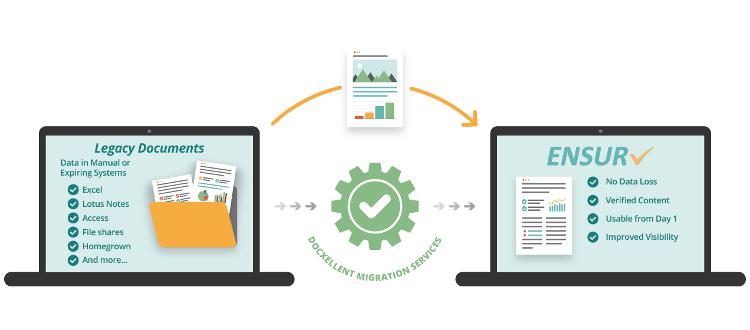
7 reasons cloud computing makes document management systems (DMS) accessible to companies, including yours
Companies have their hands forced by regulatory compliance. Others are purely drawn to the time- and cost-saving benefits of streamlined processes, data security, document control solutions, improved collaboration, and dependable convenience.
Companies of all sizes are moving archaic, manual processes to efficient, controlled document management systems (DMS) designed specifically for document workflow, storage, and retrieval. Gone are the days of searching the network for the most recent version of a file. Gone are the days of circulating documents throughout corporate headquarters to get signatures.
The global document management system market is forecast to nearly double by 2024 to $6 billion,* and cloud computing is driving much of that growth. Why? Cloud document management offers seven advantages over its on-premise sibling—advantages that appeal to a wider range of organizations.
No installation or maintenance required
On-premise DMS require information technology (IT) departments to purchase, install and maintain hardware and software. Though large enterprises might have the necessary resources, it’s often a challenge to get department-level projects like a DMS rollout to rank high on IT’s priority list. On the other end of the spectrum, small companies often don’t have the IT resources required to support a DMS in-house.
With cloud-based document management, companies essentially transfer the IT responsibility to vendors whose only job is to maintain the document control application. Setup can be completed in minutes, not months. If you ever have questions or problems, the response time and resolution time from a vendor (who’s a DMS specialist) can be quicker than your own IT department. In addition, your system upgrades or patches are done automatically in the cloud.
Uptime and Redundancy
Many companies don’t like the idea of having servers on site. They have to plan for contingencies such as power outages, floods, and freak accidents. Cloud document applications are designed with redundancy to ensure business continuity. Administrators can also sleep well at night knowing that their data is backed up in multiple locations. Robust cloud-based servers provide a level of stability and reliability that companies generally can’t achieve on their own.
Document Management System Easy Access
DMS users aren’t always in the same department or even the same location. Sometimes companies grant access to customers or vendors who are in a different part of the country or different countries. Senior managers are frequent travelers, which makes getting their John Hancock a little challenging. With cloud-based DMS, it’s easy for all of these users to log in from anywhere at any time. Instead of making your users log in through a virtual private network (VPN) to collaborate, a cloud-based DMS is open and secure. And, as a bonus, applications run faster in the cloud than on a VPN.
Maintain Cloud Security
Cyber threats are continuously evolving. Companies fear that they don’t have the time or expertise to ensure firewall and network safety on their own. With a cloud-based DMS, experts are responsible for security. Users just know they can go to a secure location in the cloud, which offers several layers of security. Of course, hosting providers offer one layer to protect infrastructure and the network. In addition, DMS vendors are constantly monitoring their document control application, looking for instances of malware and hacking in real time, and continuously updating the software as new threats emerge.
Vendor Validation
Similarly, vendors are responsible for validating cloud document management software. This relieves the user of getting third-party validation or self-validating the system to comply with regulations. Users are always updated about version launches, release notes, and scheduled updates. Each time, vendors run a new set of validation scripts and documentation is provided to users. Since vendors are the experts and they know what to look for, users are happy to let the vendor write test scripts.
Quick, low-cost setup
Setting up an on-premise DMS can take months or more, especially if you need to validate the application. This can be costly and time-consuming. Even for a non-validated DMS, companies have internal processes for organizing hardware and deploying an application. In contrast, a cloud DMS is virtually plug & play—users can begin working immediately after the new instance is provisioned.
Scalability with Document Control
Often, DMS implementations start with a few users or a single department. But, as people learn about the capabilities of a DMS, usage expands to other departments or the entire company. Scaling users with an on-premise DMS may require additional hardware to provide adequate storage and processing power. With a cloud DMS, licenses can be added as needed. In a matter of minutes, users can easily be added to a cloud-based system.
Cloud computing’s affordability, reliability, and scalability make document control systems accessible to groups, departments, and companies that may be challenged to host a DMS in-house. Now, companies of any size in any industry can achieve the promise of improved productivity and increased profitability with a cloud-based DMS.
*Source: Global Market Insights, Inc.





























